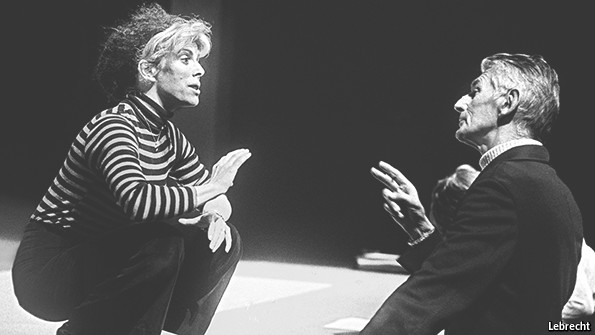
ALL that could be seen was her mouth. A mouth that opened and closed convulsively, clenching its teeth, flickering its tongue, like some glutinous, repulsive sexual object. Out of it came a stream of wild, jumbled reminiscences, faster and faster:
a voice she did not recognise…at first…so long since it had sounded…then finally had to admit…could be none other…than her own…certain vowel sounds...she had never heard…elsewhere…so that people would stare…and now this stream…not catching the half of it…not the quarter…no idea…what she was saying…imagine!…no idea what she was saying!
This part, almost the only part, which Billie Whitelaw played in Samuel Beckett’s “Not I” at the Royal Court Theatre in London in 1973 and 1975, was called, appropriately, Mouth. It was the hardest thing she ever did in her career in stage, TV and film: a 17-minute monologue, masked and in a head-brace, after weeks of word-learning so intense that she thought she was losing her mind. The public at large remembered her for her role as Mrs Baylock, the green-eyed, prim-white-collared Nanny from Hell in “The Omen”. That, she said, was just a laugh. The highest accolade she ever received was not being recognised by horror-fans in the street, but hearing Beckett’s reaction to the televised version of “Not I”, that soft Irish whisper from the back of a darkened room: “Miraculous.”
For 25 years she was the chosen conduit for the 20th century’s most challenging playwright, the author of “Waiting for Godot”. She played Winnie in “Happy Days”, buried up to her waist in sand, carefully turning out her bag as she babbled away; the Second Woman in “Play”, the role in which Beckett first saw her at the Old Vic in 1964, enveloped in an urn with her face slathered with oatmeal and glue; May in “Footfalls”, communing with her absent mother while endlessly pacing a thin strip of carpet; and, in “Rockaby”, an ancient woman listening to her own voice as she slowly rocked herself to death.
She never pretended to understand these plays. She just thought of them as a state of mind, something she could recognise in herself. That was what Sam wanted: no interpretation, just perfection. If, almost unwittingly—for she wasn’t good at words, couldn’t spell and seldom read books—she replaced an “Oh” with an “Ah”, or paused minutely too long, upsetting the rhythm of his music, she would hear his murmured “Oh Lord!” from the stalls, and see his head fall to his hands. He was always her best, gentlest and most exacting friend. In a way they were like lovers, walking arm in arm when she visited him in Paris, and rehearsing in her kitchen close up, she speaking directly into his pale, pale, powder-blue eyes, as he whispered the lines along with her. When he died, in 1989, she felt that part of her had been cut away.
Stutterer, chatterbox
It seemed unbelievable that it was her voice in Beckett’s mind when he wrote. It was nothing special to her. She had a Yorkshire accent, reflecting her Bradford childhood, but after a run of early TV typecasting in “trouble at t’mill” dramas it had become residual, like her fondness for meat pies and Ilkley Moor. Her northern roots showed mostly in her liking for blunt, straight talk. At 11, after her father died, she had developed a stutter, which her mother thought might be cured by taking up acting. The cure worked so well that she became a staple on BBC radio’s “Children’s Hour”, playing rough-voiced boys at ten shillings a time, and at 14 started to act for Joan Littlewood’s Theatre Workshop. Any challenge or crisis, though, could bring the stutter back, together with paralysing stage-fright. When she played Desdemona to Laurence Olivier’s Othello at the National Theatre, in 1963, she could hardly stop her voice trembling.
Small wonder she was nervous. She had never read Shakespeare then, and had had no classical training. Her years in rep had mostly consisted of playing dizzy blondes, busty typists and maids. Although she seemed strong-willed, sexy and beautiful, to herself she was always an outsider and an embarrassment. She was not intellectual or sociable, and her hair, her mother always said, looked like straw on a muck cart. As a child she had never wanted friends to see her poor house, with mildew on the laundry piled in the bath; and even as a star of stage and screen, consorting with Hitchcock (for “Frenzy”), Albert Finney (for “Charlie Bubbles”) and Gregory Peck (for “The Omen”), living in a big house in Camden Square, she disliked asking people in. She won a BAFTA for “Charlie Bubbles” in 1967 and was nominated for playing Violet, the adoring mother of gangsters Ronnie and Reggie, in “The Krays” in 1990. But acting, she thought, was “a bit of a flibbertigibbety occupation”.
Her life seemed to bat back and forth between optimism and pessimism, failure and success, husbands and lovers, with her just bobbing along with it like a piece of wood on the tide. There was a chatterboxy self who burbled and gossiped away, and the joyfully silent Billie she became at her cottage in Suffolk, pottering in her wild garden with the birds. In her long career declaiming words, she had never minded silence. Sam had never minded silence. His wisest piece of advice to her, his muse and mouth, advice she always remembered with laughter, was “Never speak.”
